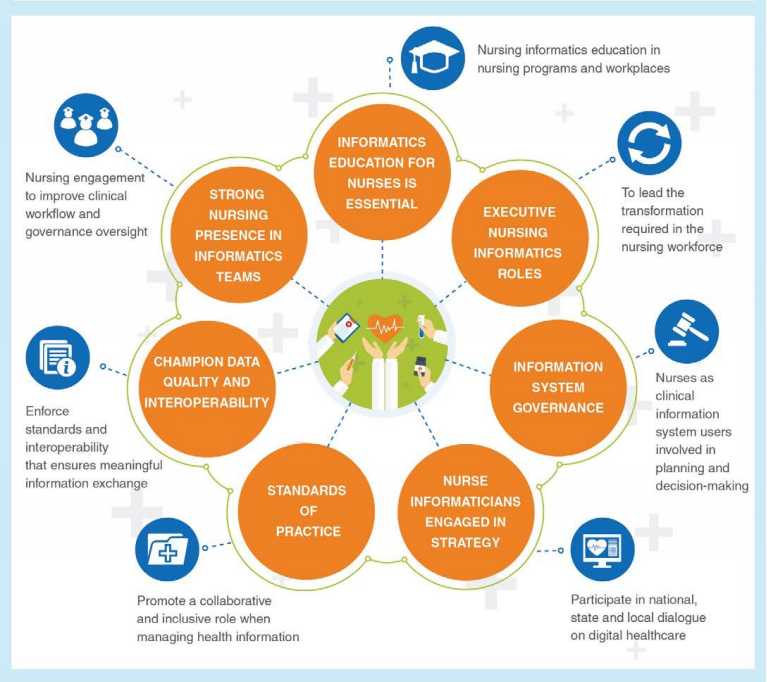Data-driven nurses ask for a voice in Australia's digital health strategy

Nursing informatics position elements
A consortium of organisations representing nurses in Australia is advocating for their role in digitally transforming the country's healthcare, arguing that it makes sense for nurses to lead in decision-making and act as knowledge brokers to transform services and empower patients.
The Nursing Informatics Position statement, developed by the Health Informatics Society of Australia, Nursing Informatics Australia, and the Australian College of Nursing, touts the role of nurses in the widespread implementation and adoption of digital health technologies as pivotal for the primary purpose of improving safety and quality of patient care.
"While the Australian healthcare system is the envy of many countries, in recent years, levels of improvement in health system performance have remained static and it may be argued, have plateaued," the report [PDF] explains.
"With strong commitment and enthusiasm to invest in clinical systems and rapidly move away from paper-based clinical documentation, there is an expectation that improved information management capability and data analytics will break through existing health system performance thresholds.
"However, technology alone will not achieve results."
Informatics is defined by the group as the integration of nursing science with multiple information and analytical sciences to identify, define, manage, and communicate data, information, knowledge, and wisdom in nursing practice.
According to the report, nursing informatics supports the likes of nurses, consumers, patients, and the inter-professional healthcare team in decision-making through the use of information structures, information processes, and information technology.
"All nurses must have some knowledge of nursing informatics to deliver healthcare in the digital age," the report adds.
The group also argues that building systems without clinician involvement has not been successful in the past, and that without opportunity for co-design with healthcare providers, the unintended consequence of further fragmentation of information and services is likely to arise.
"Practising clinicians -- nurses specifically -- must be enabled to take a leading role in digital healthcare to ensure technology is designed and used effectively," the report said. "Nurses must ensure that technology does not get in the way of patient care, but rather enhances capacity to deliver better, safer care."
The consortium believes successful planning, implementation, management, and sustainability of such technologies cannot be achieved without the "unique" contribution of nurses.
The report followed the release of Australia's digital health strategy on Monday after the green light was given from the Council of Australian Governments Health Council to automatically sign citizens up to the service.
It will see all Australians have a My Health Record by 2018, and all healthcare providers able to contribute to and use health information in My Health Record on behalf of their patients by 2022.
Despite approval from the council, there is currently no overarching standard in place to govern the sharing of data, with a public consultation on draft interoperability standards to determine an agreed vision and roadmap for implementation of interoperability slated to occur "by the end of 2018".
"Base-level requirements for using digital technology when providing care in Australia will be agreed, with improvements in data quality and interoperability delivered through adoption of clinical terminologies, unique identifiers, and data standards," the strategy explains.
"By 2022, the first regions in Australia will showcase comprehensive interoperability across health service provision."
The strategy, compiled with support from all eight Australian state and territory governments, said governments are embarking on major projects to implement state-wide electronic medical records and to achieve integration across the range of clinical information systems in hospitals and health services managed by a state or territory government.
While each state and territory is working within its own investment cycle, with its own software and integration partners, and is at a different point in achieving their respective goals, Australia's Digital Health Agency said there is a common pursuit to make health and, for some jurisdictions, human services information available in a more "timely and usable way".
Orion Health this week scored a five-year interoperability contract with the Department of Health and Human Services (DHHS) in Victoria.
The company's interoperability solution, Rhapsody Integration Engine, will be installed across the DHHS and 15 public health agencies. The organisation sought a vendor to help with its state-wide Health ICT Strategic Framework to connect all systems across the state, and deliver a health messaging integration application to replace a legacy solution.
Meanwhile in South Australia, concerns have been raised by the Australian Medical Association (AMA) over a new electronic records system being rolled out across the state's public hospitals. The AMA argued it is possibly not fit for purpose after surveying over 200 staff, including doctors and nurses, on their views of the AU$422 million enterprise patient administration system.
Almost 40 percent of respondents said their opinion of the system was poor.
The state's Health Minister Jack Snelling believes those who responded to the AMA survey were not representative of the wider medical workforce, calling them "serial whingers" in SA Parliament.
